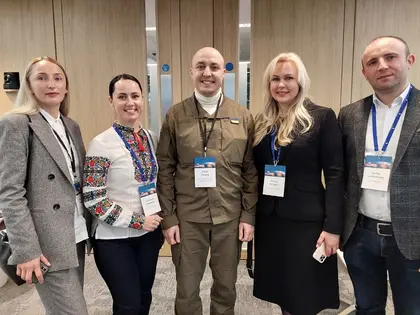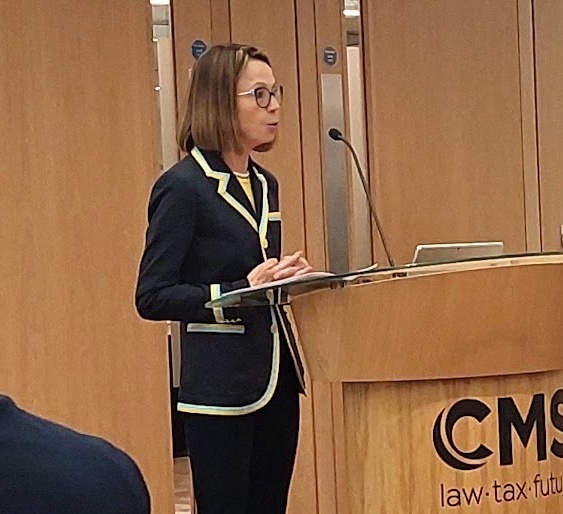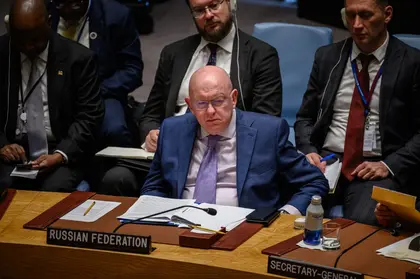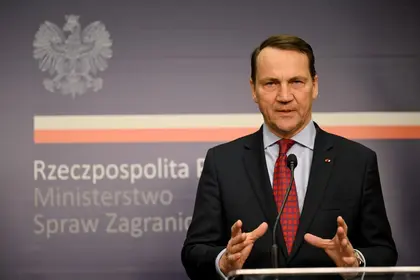As Ukraine, with the help of its allies, pursues victory against the destructive Russian predator, a discussion on the future reconstruction of Ukraine is underway. Private financing is a top priority, but questions remain over Ukraine’s governance and management.
The Ukraine Infrastructure Forum took place in London on Dec. 2, organized by the Strategy Council with support from a host of sponsors. Attendees included representatives of the international finance and banking sectors, private business, the Ukrainian government and representatives from Ukraine’s local authorities.
The forum sought to build on the agreements and structures of the benchmark Lugano forum earlier this year and prepare a system of reconstruction following the cessation of hostilities.
While Russia’s war against Ukraine continues to rage and new waves of Russian missiles rain down on the country, restoration of the vast quantity of infrastructure destroyed by Kremlin aggression may seem like a distant future.
However, aware that the country needs to kick reconstruction into gear from the first day of victory, the Ukrainian government is looking to have systems and partners in place well in advance.
Importance of private financing
Whilst favorable that Ukraine’s partners have not abandoned the country in its time of need, the scale of the work at hand is dauting even for the most robust publicly funded body. As such, privately financed projects remain the priority.
Susan Goeransson, director for the Municipal and Environmental Infrastructure of the European Bank for Reconstruction and Development (EBRD) said “Ukraine has always been a key country of operation for us. We have a portfolio of $4.4 billion and 53 percent of that is in infrastructure.”
The EBRD has already committed $1.1 billion this year and is looking to provide a further $1.5 billion next year.
Goeransson said “I am talking of energy security and vital infrastructure. This has included a liquidity loan to Ukrenergo and loans to Naftogaz and the Ukrzaliznytsya.”
Financial help is also being provided by the International Financial Corporation (IFC) of the World Bank. Already offering $2 billion to fund the private sector and local governments, it is now ensuring the supply of critical goods and services in the wake of Russian missile barrages.
It recognizes the importance of assessing levels of funds that Ukraine will need for reconstruction, as well as making it deliverable through a breakdown of priorities and sectors in need of financing.
Patric Acato, IFCs principal operations officer, said “That analytical base is key and something that we should be doing right now.”
Obstacles
However, issues relating to what Ukraine’s model of governance and infrastructure management will look like, continues to worry western investors.
Christopher Mackenzie of IST is in the business of refurbishing sewage pipes – a growing problem in Ukraine since the systems are based on Soviet period infrastructure. He spoke of the environmental and “healing” issues the country faces if this vital infrastructure sector is not addressed.
Echoing the worries of larger institutional investors, Mackenzie voiced concerns over current governing structures, saying “Kyiv is a bottleneck for the municipalities. They don’t like to hear it, but it’s how we see it as operators.”
Perhaps the solution to the ever-present question of governmental transparency is privatization. With reference to sewage pipe liners, Mackenzie said “Why are we buying all this liner from Germany. Why can’t Ukraine make its own liner? What’s holding us up? Maybe it’s time we talk of privatizing water and sewage systems in Ukraine.”
Reassuring investor concerns regarding Ukrainian governmental “interference” in private investment, Oleksandr Gryban, deputy economy minister of Ukraine, took time to reiterate Ukraine’s commitments to privatization and continued governmental guarantees of lawful means of doing business.
Another discussion, vital to Ukraine’s future, covered the needs of the agriculture sector.
Speaking for Ukrainian agricultural producers, Julia Bereschenko of Astrata voiced her concerns over farmers’ ability to export produce. Ukraine’s export commitment in the present war climate stands at 4 million tons per month. However, Bereschenko expressed doubt about the country’s ability to deliver.
“The throughput of seaports is down from ten to five vessels per day, and the 4 million ton [commitment] may not be achievable. In addition to increased logistical costs, small farmers are losing money as logistics account for 60 to 70 percent of costs.”
“Farmers are unlikely to be able to plant all available land in spring and this will have enormous consequences for global food security. We also need to keep the sea-ports open. This is the main condition for Ukrainian agriculture to survive.”
Key issues to progress are the ongoing war combined with the sluggishness of deployment when it comes to large scale infrastructure projects. The private sector is seen as the answer by EBRDs Goeransson, saying “EBRD has showed that it can approve projects. We see that private sector investments do move much more quickly”.
IFC’s Acato was more cautions, also warning of the governmental aspect of infrastructure projects. He said: “Talking of rebuilding better – projects need to be planned well but also in government. If there is public money going into supporting these projects, we need to make sure that it’s done well”.
Reminder that the war is not over
The forum was also given a reminder of what Ukraine is facing every day.
Vitaly Vlasyuk, deputy governor of the Kyiv regional military administration, outlined the current achievements of the government in dealing with the horrific toll of attacks and the resilience of the Ukrainian people, as demonstrated by the centers of resilience peppered throughout the country.
Often with nothing but tents with basic power and a stove for heating, they offer a chance for people to take time to charge their phones and use vital life-saving medical equipment, with parents taking children there to use inhalers and other medical equipment.
While the mood of the forum was generally upbeat, the vast scale of the undertaking to restore and renew Ukraine – estimated at no less than $1 trillion, opened many questions that will need to be addressed in the near future.
You can also highlight the text and press Ctrl + Enter







Comments (0)